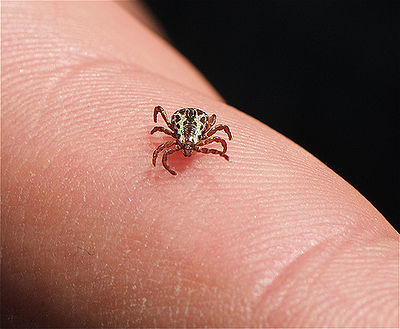
Rocky Mountain Spotted Fever is another tickborne disease. Despite its name, it has spread throughout North and South America. RMSF is carried by the American Dog Tick, the Rocky Mountain Wood Tick and the Brown Dog Tick.
The ticks bite small mammals, chipmunks, squirrels, rabbits, etc. who are infected with the disease, a bacterium known as Rickettsia rickettsii. The host tick then latches on to another mammal, spreading the disease. RMSF is also a danger to humans. Most infections occur from March through October, high tick season, but can happen anytime.
Symptoms occur 4-5 days after being infected. Watch for high fever, blood in urine or feces, swollen lymph nodes, skin bruising, arrythmia, loss of appetite, eye pain, problems walking (ataxia).
Have your pet seen by a veterinarian as soon as possible. Your vet will take blood tests and possibly skin biopsies. Your pet may have to remain in the hospital for treatment with antibiotics, fluids, anti-inflammatories and corticosteroids. Prompt action is very important to avoid long-term problems or death which can occur within hours or days.
The antibiotic Doxycycline when given promptly is very effective. German Shepherd dogs and other purebreds seem to be affected more than other breeds.
The best defense against RMSF is to prevent tick infestation. There are many products on the market, natural or otherwise that are effective, applied to your pet and your garden area. If you do find a tick on your pet, use a tweezers or a special tick removal instrument and pull straight up. Don’t flush the tick down the toilet, they can survive there. Place in a container with alcohol or dish-washing liquid and seal tightly. Dispose of in an outside trash receptacle. You may want to bring the tick to your vet for analysis to check if it carries any disease.
Related Articles


